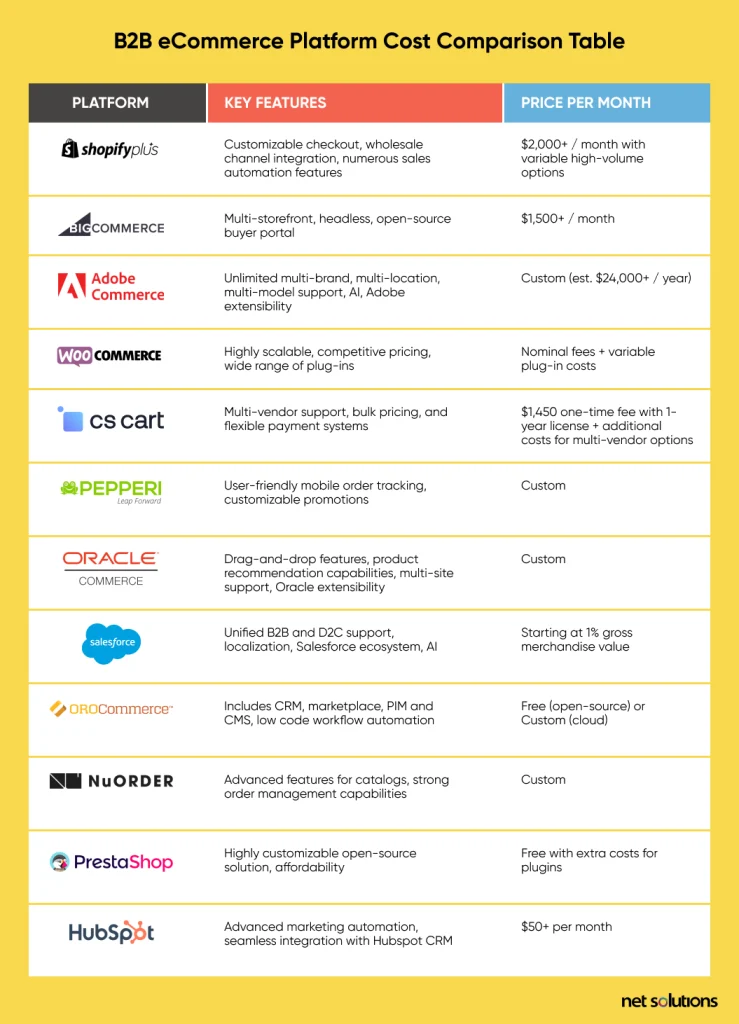Back in the day, Business-to-business (B2B) companies relied on their sales staff to take orders, connect with clients, and ensure customer satisfaction. Those human connections still play an essential role in B2B sales, but today’s buyers demand more—functionality that only a B2B eCommerce website can deliver.
A B2B eCommerce platform can greatly enhance the customer experience by improving the ordering process, providing customized offers, optimizing and fulfilling supply-chain logistics, and much more. It also helps B2B businesses gather and analyze customers, improve marketing efforts, and thrive in competitive markets.
How Much Does Building a B2B eCommerce Platform Cost?
Building an enterprise-grade B2B eCommerce platform can cost $50,000 or more. How high it goes depends on the features you’re hoping to implement, but don’t worry—we’ll break down the factors that influence those costs so you can build a reasonable budget.
1. Platform Licensing & Subscriptions2. Add-ons, plug-ins & extensions
3. Website Design & Development
4. eCommerce Hosting
5. Data Migration & Integration
6. Ongoing Maintenance & Support
We’ll discuss each of these items in more detail to help demystify the costs associated with designing and implementing your B2B eCommerce solution. That way you can build an accurate budget before moving forward.
Looking for inspiration? Visit our blog post covering examples of excellent B2B eCommerce websites.1. Platform licensing & subscriptions
Enterprise-level B2B websites usually require powerful eCommerce platforms that go far beyond what simpler eCommerce platforms provide.
To achieve the level of sophistication you require, most B2B businesses use platforms like Adobe Commerce (formerly Magento), BigCommerce, Shopify Plus, and Commercetools. They also frequently use platforms like Contentful (to manage content), Akeneo (for Product Information Management), and Algolia (for AI-powered search).
The eCommerce platform will constitute a major line item in your eCommerce budget. The licensing fees for Adobe Commerce, for example, will vary based on the package you choose and factors like your Gross Merchandise Volume. That’s anywhere from $20,000 per year (for a business with a $1,000,000 GMV) to around $200,000 per year (for companies with a GMV of $25 million or more).
2. Add-ons, plug-ins & extensions
Add-ons, plug-ins, and extensions (all the same thing, by different names) add features that don’t come with the off-the-shelf version of an eCommerce platform, and they can provide a cost-effective way of extending the functionality of your website without requiring extensive customization.
Adobe Commerce and Shopify Plus have thousands of extensions ranging from free to $500+ each. For a large enterprise, extensions won’t end up costing you much relative to the total price tag, but they do factor into the equation.
3. Website design & development
Website design and development represent a significant cost when it comes to launching a B2B eCommerce website, but for larger companies, pre-built themes aren’t a good option. Not only do you want to stand out with impactful design, but you’ll also need to customize elements of the customer journey for your clients.
This may include things like bulk and negotiated pricing, orders for different types of users (e.g., wholesalers and retailers) that require customized workflows, and multi-tier approval processes. And that’s just scratching the surface!
Depending on the complexity of your business needs and customization requirements, the design and development portion of your B2B website can cost between$50,000 and $200,000.
4. eCommerce hosting
Adobe Commerce, and many other B2B platforms for eCommerce sales, offer their own cloud hosting. However, enterprises often use outside cloud computing services like Amazon Web Services (AWS), Microsoft Azure, and Google Cloud Platform (GCP) for hosting.
For example, cloud hosting comes with the Adobe Commerce Managed Services package, which is more expensive than the Commerce Pro package (which requires customers to secure outside hosting).
The Managed Services plan includes other features, such as dedicated support from a customer success engineer, planned event management support, and more.
Companies that use a separate cloud computing service must factor those costs into their budget. Each cloud computing service has its pros and cons, so evaluate your options carefully. Choose the one that meets your current needs and sets you up to scale in the years to come.
5. Data migration & integration
If you’ve been in business for more than a year or two, you’ve got all sorts of customer data you probably won’t want to lose by starting over from scratch. This can be vital for business continuity along with business intelligence and strategy planning, but migrating a large amount of data or replatforming can amount to a significant expense for large companies.
Depending on how much data you need to migrate and the complexity of data integration involved, these costs can range from $5,000 to $50,000 or more.
6. Ongoing maintenance & support
It’s important to understand that software development is never a one-and-done situation, and the same is true for building and running a B2B eCommerce website. Websites require changes and updates to incorporate new features and better serve customers, and they require maintenance such as security updates.
You can hire an in-house team to handle maintenance and support if they have the time and experience required, but many large companies work with managed service providers. This is often a more cost-effective option since in-house employees come with hidden costs like payroll taxes, recruiting costs, onboarding, etc.
Rather than listing an overly simplistic price range, take a look at our post that covers IT managed services costs and pricing models in 2024.
B2B eCommerce Platform Cost Comparison Table (with Features & Pricing)
We’ve created this comparison table of popular eCommerce platforms for B2B sales. Each platform has different capabilities and pricing, so be sure to investigate each platform to determine which is right for you—or contact us for guidance.
Disclaimer: The information below is accurate as of May 10, 2024.

Other B2B eCommerce Costs to Consider
The creation and optimization of a B2B eCommerce store can come with additional expenses.
Some of the expenses we’ve listed below go beyond the fundamental needs, while others aren’t worth expounding on because they’re not too complicated or the price tag is small compared to the major expenses you’ll incur running an eCommerce business.
Nevertheless, we wanted to list them here so you have a clear understanding of the costs associated with your B2B online storefront.
SSL certificates: SSL certificates communicate to visitors that your website is safe and secure, which is especially important when they’re entering payment information or providing other sensitive information. They only cost between $20 – $70 per year, so they’re not a significant expense for enterprises.
Payment processing and fees: It’s important to offer as many payment gateways as your clients require, and that may include credit card payments—although B2B customers often use different payment channels like purchase orders and other payment options for large orders.
Data backups: Data backups are vital, and costs will vary based on the total amount of data being backed up.
Inventory management: Companies with physical products may want to consider sophisticated inventory management software that integrates with your eCommerce website, your Enterprise Resource Planning (ERP) software, and your Client Relationship Management (CRM) software.
Regular User Experience (UX) improvements: Any good outsourcing partner will factor UX into the equation from the beginning, but continually testing and updating your UX will improve the customer experience and keep them coming back.
Customer support: Customer support may constitute a major expense, but it can save you money in the long run by allowing your sales team to focus on building relationships and engaging in outbound sales activities.
Budgeting Tips for B2B eCommerce Platforms
As you can see, building a top-notch online store targeting business clients can be a pricey endeavor, but it’s necessary to remain competitive. The following tips can help you keep your budget reasonable.
- Identify your needs: Careful planning upfront, outlining things like which B2B features your website needs, which sales channels your website has to address, and other factors will reduce rework and unnecessary costs.
- Compare pricing models: All the services you use to manage your eCommerce website will offer different pricing models. Analyzing pricing models for different vendors and choosing the most cost-effective ones will help you keep your budget in line.
- Factor in long-term costs: Scalability is a key benefit of the eCommerce model, so consider how your costs will change as your business grows in the future.
How Much Does It Cost to Outsource Your B2B eCommerce Development?
Outsourcing the design and development of an eCommerce website can cost between $50,000 and $200,000 or more depending on what’s required.
One way to keep those costs in check is to work with an outsourcing partner that has experience with B2B eCommerce website development—including user research, UX and UI design, testing, etc.
Choosing the right vendor requires careful vetting, from reviewing customer case studies to asking tough questions about their eCommerce development services. A good partner will get to know your unique business needs and help you achieve your eCommerce goals.
Ready to Optimize Your eCommerce Efforts?
Net Solutions has been developing software for international brands for nearly 25 years, and we’ve designed and developed B2B eCommerce platforms for leaders like Euro Car Parts, Bonds of London, and more.
We can help you maximize sales and reach more B2B clients with a new, fully optimized, and future-proofed eCommerce website. We can help with specific elements of your strategy, or we can handle everything: Project management, business analysis, user research, UI and UX design, development, testing, security, and ongoing maintenance.
Frequently Asked Questions (FAQs)
1. Are there any hidden costs when building a B2B eCommerce platform?
There are a number of costs that may catch you off-guard when budgeting for a new B2B eCommerce website. We’ve outlined those costs in detail in this blog post, but a few that might surprise you include data integration, ongoing maintenance, data backup, and staffing your support team.
2. How can you calculate the cost of an eCommerce website project?
Calculating B2B eCommerce website costs starts with understanding your business needs and making note of the existing technology you might want to incorporate. Make a list of must-haves and nice-to-haves, and determine what fits your budget—keeping in mind that you want to future-proof your business by ensuring long-term scalability.
3. Which platform is the best platform for B2B?
The best eCommerce platform for a B2B website is one that can handle all the complexities of the business-to-business market, such as data collection and analysis, negotiable pricing, supporting multiple user types (e.g., vendors, wholesalers, distributors), integrating with ERPs, inventory management software, and CRM, and more. Adobe Commerce (formerly Magento) is an excellent choice, and we’ve built many eCommerce websites using its underlying technology.
SHARE THIS POST
Table of Contents
Related Resources
- AI in B2B eCommerce: Everything You Need to Know
- Top 14 B2B eCommerce Benefits in 2025
- The B2B eCommerce Catalog: Everything You Need to Know
- The Biggest B2B eCommerce Challenges (And How to Address Them)
- The Ultimate Guide to B2B Fashion eCommerce: Strategies, Trends, and Solutions
- 18 Must-Have B2B eCommerce Features To Look For in 2025
- Headless B2B eCommerce - How to Redefine Your Business
- B2B eCommerce Marketplaces: Your In-Depth Guide
- Top B2B eCommerce Metrics to Track for Success [2025]
- B2B Mobile eCommerce - A Comprehensive Guide
- Why Your Business Needs a B2B eCommerce Mobile App
- 11 Top B2B eCommerce Open Source Platforms for 2025 [With Real Reviews]
- 12 Top B2B eCommerce Platforms for 2025 [With Real Reviews]
- B2B eCommerce Pricing Strategies: An In-Depth Guide
- Your In-Depth Guide to B2B eCommerce Replatforming
- Top 9 B2B eCommerce Trends to Watch in 2025
- B2B eCommerce UX: A Comprehensive Guide
- A Step-by-step Guide to B2B eCommerce Website Development
- 9 of the Best B2B eCommerce Website Examples in 2025

